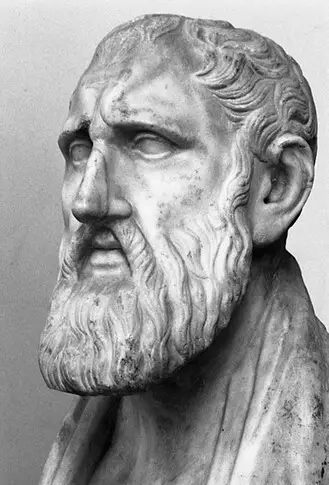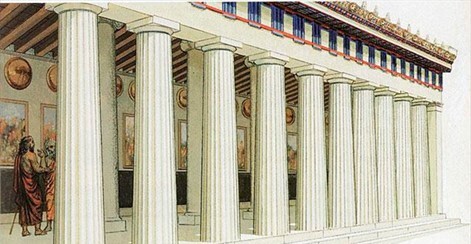Zeno of Citium was a man born in ancient Greece over two thousand years ago. He is not a household name, but his ideas and legacy have left a lasting impact on philosophy and Western civilisation. Imagine the thrill of walking through the ancient streets of Athens, asking who was Zeno?
Searching for landmarks confirming who Zeno was, you pass the Stoa Poikile (Painted Porch), where Zeno and his followers gathered to discuss their philosophy.
So, who was Zeno of Citium, and what was his philosophy? We look at the life and teachings of the founder of Stoicism, and examine his impact on philosophy, ethics, and morality. We dig into his teachings and their relevance today and ask why Zeno’s legacy is felt centuries after he died.
Join us as we uncover the fascinating story of who Zeno was, and his enduring impact on the world.
Zeno’s Early Life and Influences
To find out who Zeno was, we begin, by exploring his early life and influences.
Zeno’s Birth and Family Background
Zeno was a philosopher from the Hellenistic era. He was born in 334 BC in Cyprus of a father who was a merchant, and the family was not wealthy.
Zeno’s Education, Influences, and Love of Philosophy

Zeno’s father was a traveling merchant who brought home philosophy books from his travels for Zeno. Zeno fell in love with the philosophical tradition, and he continued to seek out philosophical ideas and teachings in his early adulthood.
But it was a shipwreck that kick-started Zeno’s career in philosophy. He was stranded in Athens – the land of philosophers. He famously walked into a bookstore, where he was introduced to Crates of Thebes, a prominent Cynic. While Zeno studied under many philosophers, such as Stilpo and Xenocrates, it would be Crates’ teachings that influenced him the most.
Key Principles of Stoicism
In its infancy, Stoicism was known as Zenonism.
Zeno took everything he learned from other great philosophers and wove it into what we now know as Stoicism. In the process he became the founding thinker of Stoicism.
The Cynics were instrumental in shaping Stoicism. Their first and most direct influence was on its founding. Cynicism is a school of philosophy that emphasises living in accordance with nature, virtue, independence, individual freedom, and skepticism.
Cynicism originates in the philosophical schools of ancient Greece that claim a Socratic lineage. To call the Cynics a “school” though, immediately raises a difficulty for so unconventional and anti-theoretical a group.
– Internet Encyclopedia of Philosophy
Living in Accordance with Nature
The idea of control is central to Stoicism. Zeno insisted that we distinguish between what we can control, and what we cannot control.
Stoicism stems from the idea that we should live in accordance with nature. Nature, Zeno argues, is rational and logical. Therefore, to live in accordance with nature, we must be rational and logical – Stoic.
From there, Stoicism takes a further step. Nature consists of causes and effects, which we have absolutely no control over. If we realise that we have no control over external events, it would be irrational to concern ourselves with these events. Instead of worrying, dwelling on, or dreading events or circumstances that are out of our control, we should accept the events of the world.
We do, however, have control over our response to external events. This is the flip side of the Stoicism coin. Since we can control our own emotions and perceptions, we should endeavour to respond rationally.
Self-Control and Acceptance
Stoicism is about understanding and accepting bad things happen. So, we should quell our desire for good things because we have no control over what may or may not happen. Rather, control our responses to happenings in the external world, good or bad.
A simple example – we have no control over the weather. So, why concern ourselves with whether or not it will rain cats and dogs on the day of our outdoor wedding. Instead, accept that it could rain and ruin the cake. Some guests may not show up, and auntie may slip and break a leg, right in the middle of the ceremony. Accepting bad events may occur is necessary, according to Stoicism, so we can orient ourselves toward making sure our responses are rational and reasonable, whatever the circumstances.
Morality, Virtue, and Vice
To improve our emotional and behavioural responses, Zeno argues that we must hone our virtues. Borrowing from earlier philosophers, Zeno argued, there are four cardinal virtues that we should strive to hone:
- Wisdom – is the most important virtue, according to Zeno. Wisdom allows us to understand the laws of nature and accept our lack of control over external events.
- Justice – is a virtue that gives rise to social harmony. A sense of justice leads us to treat people fairly and respect the rights of others.
- Courage – allows us to overcome fears, weather hardships, and take risks.
- Moderation – entails self-control and balance in life. Stoicism emphasises the avoidance of desire and excess. Moderation also allows us to avoid engaging and indulging in harmful behaviours that may not be rational or logical.
Zeno said – all that is virtuous is also rational and logical. Conversely, all vices and evil are irrational and illogical, and are not in accordance with nature. It follows that to live a virtuous life is to live a moral life.
Zeno’s Teachings and Impact
Zeno was a brilliant thinker, but he was also a great teacher. The influence of his lectures, discussions, and written works is prevalent in the work of his disciples and contemporaries. It is only through their work we know of his.
Unlike Socrates, who never wrote anything down, Zeno wrote many works. It is a tragedy that none of them survived. To have no surviving works, like Socrates, and still be revered throughout history, emphasises the impact Zeno had on those who were privy to his teachings.
It is thanks to them we know who Zeno was.
How Zeno Taught his followers

Zeno was influenced by the work of Socrates and practiced his philosophy in a similar way to Socrates, who famously travelled Athens teaching. Zeno held lectures and led discourse at the Stoa Poikile (Painted Porch) in ancient Athens.
His lectures and discussions were generally open to the public. It is important to note, however, that the lower-class and slaves were unlikely to be included. Despite this, Zeno’s teachings and Stoicism are known for inclusivity and accessibility. Rare for the time, Zeno’s Stoicism held women equal to men.
Painting of the Stoa Poikile, Athens
https://www.archaeology.wiki/blog/2013/03/22/ascsa-to-continue-excavations-at-the-site-of-stoa-poikile/
Zeno’s method of teaching was heavily influenced by the Cynics, who were shameless in spreading their teachings. Practicing most of their philosophy in the Agora, the Cynics told citizens how best to live their lives, and the ways in which they were not living as they ought to.
Zeno was notably less shameless in his teachings, but not so in the method he used within the school of Stoicism.
Famous Stoics influenced by Zeno
Zeno founded a philosophy that would be studied, adopted, and practiced by many famous philosophers after him.
Cleanthes, a renowned Stoic, studied directly under Zeno, and took over as the head of the school of Stoicism after Zeno passed away. Following Cleanthes death, Chrysippus, another famous Stoic philosopher, took on the role. Without Zeno’s influence, it is likely that we would have never heard of many of the great thinkers that we study in modern times.
The Influence of Stoicism on Later Philosophers
Since Zeno developed Stoicism, countless philosophers have learned from his teachings. Cleanthes and Chrysippus were the most prominent early Stoics, and both took their turn as heads of the school of Stoicism following Zeno’s death.
Down the road, Seneca, Epicurus, and Marcus Aurelias introduced Stocism to Rome. Life in the Roman Empire was not easy, and Stoicism supported people through the hardship of the times. Death, fear, and disappointment were a part of daily life in Rome, and Stoicism provided a framework for inner peace.
Anyone who has ever studied Stoicism has studied the work of Zeno, and his influence permeates the work of every famous Stoic who has existed since his time. And it is not just Stoics who Zeno influenced. Philosophers across a wide range of schools of thought have been impacted by Zeno’s work.
Zeno’s Legacy and Modern Impact
Zeno died around 260 BC. It is exceptional for one person to have such a profound and enduring impact. Zeno’s legacy has spanned many centuries. His teachings are as relevant in modern times as they were in the ancient world.
How Stoicism has been Revived in Modern Times
Stoicism continues to be studied, appreciated, and practiced to this day. It has evolved as humans and the world has changed.
Stoicism has always emphasised self-improvement, and for living a peaceful life. Zeno, the early Stoics, and especially the Roman Stoics, adopted Stoicism as a strategy to be a good, moral citizen. Since then, Stoicism has shifted to further emphasise self-improvement and emotional self-regulation.
Stoicism has had a great impact on the development of psychology. Once psychology thrived, the relationship became reciprocal. Psychology impacted the school of Stoicism. Modern Stoicism, for example, is a formal collaboration between psychotherapists and modern stoics.
Stoicism has experienced a boom in popularity in the modern world. As with so much, the age of the internet and information availability has made the teachings of the Stoics more accessible than ever before. This increased accessibility, as well as Stoicism’s applicability and relevance, has contributed to its revival.
Ryan Holiday and Massimo Pigluicci are two examples of modern Stoics who have popularised the Stoic tradition for a new generation. Piglucci’s TedxAthens lecture has been viewed almost two million times, and Holiday’s videos on the Daily Stoic YouTube channel have been seen by millions, as well.
Final Thoughts
Back to the question: Who was Zeno?
Zeno of Citium’s influence on philosophy and Western civilisation cannot be overstated. Through his development and teaching of Stoicism, he gave us a new perspective on ethics, morality, and the human experience. Stoicism has been revived and practiced as a philosophy for life many times since Zeno’s death. It is a practical philosophy that is highly relevant to our lives, and is easily applicable.
Zeno’s philosophy has influenced countless thinkers over the centuries, from the Stoics of ancient Rome to modern-day practitioners of Stoicism. His ideas remain relevant today, providing us with a framework for navigating life’s challenges and finding meaning and purpose in our existence. Zeno’s legacy serves as a reminder of the power of ideas and the enduring impact that a single person can have on the course of history.
As we contemplate Zeno’s teachings and their relevance today, we are invited to consider what it means to live a life of virtue, wisdom, and resilience.
Perhaps the greatest lesson that Zeno of Citium left behind is that the pursuit of knowledge and wisdom is a lifelong journey, and one that is well worth taking.
FAQs
Q1: Who was Zeno of Citium?
A1: Zeno of Citium was an ancient Greek philosopher who lived in the 4th and 3rd centuries BCE. He founded the philosophy of Stoicism and was an influential figure in ancient Athens.
Q2: What is Stoicism?
A2: Stoicism is a philosophy that emphasises the importance of reason, self-control, and virtue. It teaches that we should focus on what we can control and accept what we cannot control.
Q3: How did Zeno teach his philosophy to his followers?
A3: Zeno taught his philosophy through lectures and discussions at the Stoa Poikile (Painted Porch) in ancient Athens. He also wrote several works, although none of them survive today.
Q4: Who were some famous Stoics who were influenced by Zeno?
A4: Some famous Stoics who were influenced by Zeno include Epictetus, Seneca, and the Roman Emperor Marcus Aurelius.
Q5: What is Zeno’s legacy?
A5: Zeno’s legacy is his contribution to the development of Stoicism and his influence on ethics, morality, and philosophy. His ideas have had a lasting impact on Western civilization and continue to be studied and practiced today.

